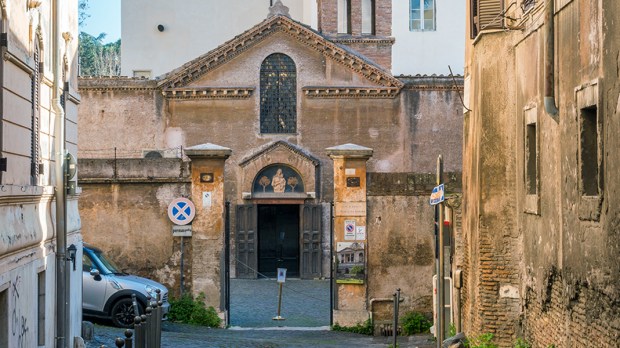Though the influence of Christianity may sometimes seem to be fading in our culture, one place it can still often be found is in our language. Many phrases we use every day have an origin in Christian history, belief, and practice.
The saying, “It doesn’t make one iota difference” derives from the 4th-century Arian controversy, where the difference between the orthodox belief about Christ’s relationship to the Father and the heretical Arian belief turned on one letter (i, iota in Greek)—homoousios (of one substance) vs. homoiousios (of a similar substance). Likewise, a “devil’s advocate” was originally the person who would make the case against a proposed saint (in order to ensure the Church had considered all aspects of the person’s life). Another famous phrase is related to the subject of today’s liturgical feast, St. Monica.
St. Monica was born in 331 in Thagaste in modern-day Algeria. While she herself was a Christian, her husband was a pagan Roman official who would not allow their children to be baptized. As her children grew into adulthood, she prayed for their conversion. One of her children worried her especially—he had traveled to Carthage to study, and had become a Manichaean, a believer in a perpetual battle between light and dark.
St. Monica prayed fervently for decades for her son to become a Christian. At long last, her prayers were answered, and Augustine became not only a Christian, but one of the greatest Fathers and Doctors in the Church’s history.
St. Augustine’s conversion was helped along by another great figure of the early Church, St. Ambrose of Milan. The three became closely acquainted, and one of St. Augustine’s letters reveals an exchange between them which became the origin of a saying we still use today.
In the ancient Church, as today, practices of church discipline could vary from region to region. As most people never ventured farther than 20 miles from their place of birth, for those who traveled more extensively, this could come as a shock.
When St. Monica crossed the Mediterranean to stay with her son in Milan, she was troubled to find that in St. Ambrose’s diocese they did not fast on Saturdays, as was the custom in North Africa. What should she do? Should she change her own habits to fit the practice around her? Or should she continue to fast on Saturdays as a personal pious practice?
St. Augustine wrote to St. Ambrose to seek his advice. St. Ambrose first quipped that if he knew of any better practice than the one his diocese currently employed, he himself would follow it! But then St. Ambrose shared a piece of wisdom which has lasted over a millennium and a half: “When I visit Rome, I fast on Saturday; when I am here [in Milan], I do not fast. On the same principle, observe the custom prevailing in whatever Church you come to, if you desire neither to give offense by your conduct, nor to find cause of offense in another’s.”
This phrase has come down to us in a simplified form: When in Rome, do as the Romans do.
St. Augustine himself said that he esteemed this advice “as if I had received it by an oracle from heaven.” This simple saying resonates all the more in our modern age, when we can travel around the world in a day and come into contact with different cultures, practices, and ideas through the array of media we possess. And it testifies to the fact that the Church has always valued unity without requiring uniformity.

Read more:
Understanding the Churches within the Catholic Church
One can see this as well in the many ancient liturgical traditions from around the world, from the Divine Liturgy of St. John Chrysostom to the Anglican Use of the Roman Rite. And the different rules on fasting and abstinence (no-meat Fridays are once again mandatory in the UK, while muskrat is an accepted “meat alternative” in the American South) remind us that the quandary faced by St. Monica still is with us today.
So, when you eat an alligator burger on a Friday of Lent, remember to send up a quick prayer of thanks to St. Monica.
Read more:

Read more:
How my son’s wedding showed me that ‘one, holy, catholic and apostolic’ perfectly describes the Church

